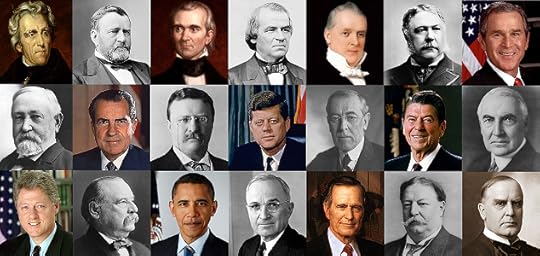Why Write About Presidents?

When I was in elementary school, I can remember these cumbersome children’s books, each about a different president, in the school library. I was fascinated by these men with funny faces, wigs and beards. I remember learning about George Washington and Abraham Lincoln, but there were all these other men left to a list in the appendix of the Social Studies book (the appendix was always more interesting to me than the actual textbook). And their look, the way they held themselves, the way they were portrayed in paintings and pictures, seemed to already speak volumes about what these men must have been like.
I’ve always liked to fill in the blanks of stories in my head. I wonder what a person’s story is. If I only hear one side of a phone conversation, my mind begins to fill in what the person on the other side is saying (and it’s usually more entertaining than what is actually being said). I wonder about what life actually was like for people in the past. History has always been a glorious playground in my mind. It is an infinite sandbox for me wander in and play with.
American history in particular is really interesting to me, not only because it is my heritage, but it is so relatively recent in the grand scheme of history. It is filled with legends and myths of our own making that proceed the Enlightenment, so we Americans have convinced ourselves our myths are more real than say English myths of King Arthur, or Babylonians and Gilgamesh. Our myths are not the stories of privilege and prestige (at least not starting out). Our heroes are heroes of the people. They make a name for themselves by what they do, not who they are. The typical American hero is the lone gunman (portrayed by Clint Eastwood) who usually does not have a name, and comes in and solves a problem for the oppressed people. While Westerns are not as popular as they used to be, the ideal American hero has not diminished in popularity. We Americans love the lone gunman (sometimes it’s a group of lone gunmans) in our stories, in our politics, in the way we choose to see the world. And in how we interpret our own history.
This is why we love stories about Washington, a general who won the Revolution (even though he led armies of thousands, and had significant help from others, we still think he won the Revolution), who came out of retirement to become president, and then left the presidency to return to farming. Or Lincoln who grew up in a log cabin, did his homework on a shovel (how did that work?), became a country lawyer known for his honesty, wit, and good ol’ country wisdom, and eventually became president in one of the most trying times of our country’s existence. These are true stories, but even the way we choose to relate them to ourselves and our children betrays what we see as truly valuable. They embody the American myth, and we continue to propagate it in the stories we tell of them.
This is not a criticism. Far from it. It’s just an observation.
We don’t tell these stories only about Presidents. We tell them about explorers, soldiers, artists, businessmen, activists. We’ll even insert it into the “ordinary” lives of the stay-at-home mom, or 9-5 worker. Their individual contributions, their tenacity in the face of overwhelming odds, their intentions to sacrifice to make a better life for others. We Americans love this. We tell stories about ourselves in this manner, and our ideal leaders follow this mold.
So, while Presidents are not the only figures in the American myth that follow this pattern, they are figures of the American ideal, which makes them (in our minds) bigger than ordinary men (King Arthur or Gilgamesh, anyone?). And we judge the legacy of individual Presidents oftentimes not on how closely they adhered to the strict legal definitions of the law, but how closely they adhered to our ideals as Americans.
This is what makes Franklin Pierce so interesting. He’s a president from history most of us know practically nothing about, but since he was a president, as Americans we have an innate sense about what he should have been. That gives a lot of room in telling a story about expectations and subverting expectations. Stories about U.S. Presidents become explorations about what it means to be a leader and an American. Can we really do it all ourselves? Are these people we idolize lone gunman (like we want to believe they were), or were they something more real?



